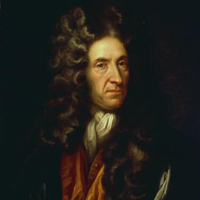Daniel Defoe - Biography and Works
Daniel Defoe (1660-1771) first wrote common project, essays, verse satire, pamphlet, periodical, realistic account and so on. But his greatest success is his Robinson Crusoe. It was the first novel written in first person narrative. It records that it was the beginning of the narrative over the English Island.

Daniel Defoe
As the period of narrative and exploration, Robinson Crusoe represents the true work of the Augustan Age. Crusoe is the prudential hero, who counts the money though he is alone in the island. He suffers from the fear of the unknown. He becomes a master and makes a slave to the man who comes there on Friday naming him as Friday.
His Moll Flanders is another interesting novel of the autobiography of a prostitute that shows English social and economic life. She educates herself through prostitution that’s why it is the true work of the age of reason. She has only a deep and constant sense of the value of money.
Defoe reduces all literature to journalism due to his autobiographical nature of writing. As city dwellers want report not philosophy, so does Defoe. His eyes for detail, his fascination with material things and with surface of human behavior, and his deep roots in the English middle class are exemplified in these two works. Both Robinson Crusoe and Moll realize the model of decorum. They pass from desertion to decorum that is, their destiny is a reason. An age which saw man as a rational creature, Defoe’s characters are appropriate to it. A keen look at homo sapiens in the Augustan Age is reflected in these works by Defoe.
In the 1720s Defoe had ceased to be politically controversial in his writings, and he produced several historical works, a guide book A Tour through the Whole Island of Great Britain (1724-27, 3 vols.), The Great Law of Subordination Considered (1724), an examination of the treatment of servants, and The Complete English Tradesman (1726).
